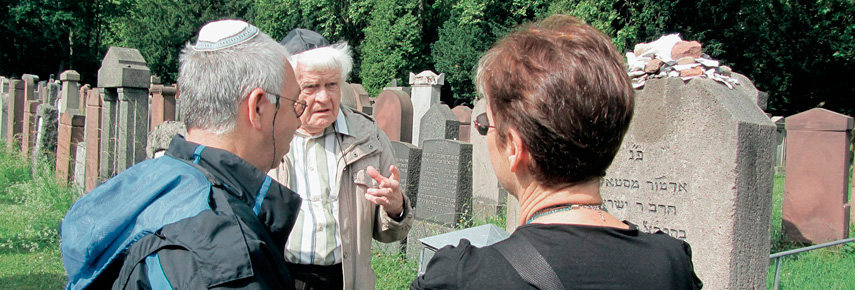Born 1927
Participation in visitation program 2006
Visited schools: Holzhausenschule, Philantropin
Addresses in Frankfurt/M.: Wolfsgangstraße 105, Sophienstraße 12
Emigration: on the Kindertransport to the UK on August 10, 1939
Return to Frankfurt as a US soldier in 1946
Parents:
Ludwig Weil, born 1873 in Sulzburg/Baden
Owned textile business “Weil, Marx & Co“ at Kaiserstraße 41 in Frankfurt/M.
Linda Weil, née Herzfeld, born 1887 in Frankfurt/M.
Sister:
Henny Weil, born 1925
Deportation of parents and sister:
October 19, 1941 to Litzmannstadt/Lodz
Father’s death date: December 30, 1941
Publications about Felix Weil and sources:
Gottfried Kößler, Angelika Rieber, Feli Gürsching (Hrsg.):”…daß wir nicht erwünscht waren.“ Novemberpogrom 1938 in Frankfurt am Main. Berichte und Dokumente”, Frankfurt 1993
Rieber, Angelika: Wir bleiben hier! Lebenswege Oberurseler Familien jüdischer Herkunft; Verlag Waldemar Kramer, Frankfurt 2004
„Aber mein Selbstbewusstsein habe ich nicht verloren“ – Jüdische Kindheit und Jugend. Lebenserinnerungen als Zugang, die Vergangenheit und sich selbst besser zu verstehen; in: Jüdische Kindheit und Jugend. Laupheimer Gespräche 2011, Ed.: Haus der Geschichte Baden-Württemberg, Winter-Verlag, Heidelberg 2012
Photos: Felix Weil / collection of Angelika Rieber
Text and research: Angelika Rieber
Felix Weil
To England on the Kindertransport
by Angelika Rieber
Felix Weil was born in 1927. His family lived at Wolfsgangstraße. His father, Ludwig Weil, owned a successful textile business on Frankfurt’s Kaiserstraße. Felix Weil initially attended Holzhausenschule, but later had to switch to Philantropin.
In June 1939, his parents sent Felix to an orphanage, so that the 12-year-old was able to leave Germany on a Kindertransport to England on 10 August 1939. His parents and his sister, who was two years older, could not escape. They were deported to Litzmannstadt/Lodz in 1941.
From England, Felix was able to emigrate to the USA in 1945, where he lives today. He returned to Frankfurt as a young soldier in 1946, after the war.
“I had a very, very pleasant childhood.”
“I was born in Frankfurt am Main on 12 December 1927. We lived at Wolfsgangstraße 105, not far from the IG Farben Building. We lived there many years, and I had a very, very pleasant childhood with my parents, Ludwig and Linda Weil, and my sister Henny,” remembers Felix Weil.
The family’s situation changed after the Nazis took power. Because their economic situation got worse, they had to move to a smaller apartment on Sophienstraße. “I could feel us moving down,” says Felix Weil. His father, Ludwig Weil, initially owned a successful textile business at Kaiserstraße, which was “aryanized” in 1938.
At first, Felix attended Holzhausenschule. When the quota for Jewish children at secondary schools was restricted to 1.5%, Felix was forced to attend a Jewish school, Philantropin at Hebelstraße. Unlike the family of his mother Linda, who were very religious, the Weils were liberal. In winter, the Weils did celebrate Hanukkah, but Christmas trees were also part of their life.
“No dogs or Jews allowed”
The family felt restrictions on their freedom of movement creeping in. Felix has a clear memory of the swimming pool in Königstein, which he liked to go to. Here he was confronted with increasing exclusion from public life. Together with his sister Henny, he often went to a Jewish summer camp in this spa town. They often went to the public pool in the summer, until one day they saw a sign. Felix still remembers the wording: “No dogs or Jews allowed.” Now only the Jewish pool in Frankfurt-Niederrad was left to them. The boy experienced this restriction as the first sign of growing Anti-Semitism.
Felix was torn between his wish to belong and the reality of exclusion. “When I was nine”, he recounts, “I had an experience that really aggravated me. The Hitler Youth had such wonderful uniforms with black pants, brown shirts and knives under their belts. They marched through the streets, carried flags, and I wasn’t allowed in. I was angry at not being allowed to join the Hitler Youth. I walked along the sides and followed their instructions, ‘left, right’, and so on. Finally the squad leader came and said: ‘You nasty little Jew, get off the street. This is not for you!’”
Smoke filled the air
Although the family often felt the increasing exclusion of Jews, they did not feel as if their lives were in danger until the November Pogrom.
After the “Kristallnacht” everything changed very quickly, remembers Felix Weil. Fortunately, the family was spared by the riots in November 1938. Felix Weil remembers hearing sirens and seeing fire trucks and policemen everywhere. Smoke filled the air.
Before the November Pogrom, Ludwig Weil had rejected the idea of emigrating. “My father believed that it would all soon be over, that the Nazis would lose power, and that things would normalize soon. Why should he go? He had been awarded the Iron Cross in World War I, had fought for the Germans, and had no fear that he could be a target.”
After the November Pogrom, however, his opinion changed. In June 1939, his parents sent Felix to an orphanage of the Flersheim Sichel Foundation, where he waited to be brought out of Germany on a Kindertransport.
Many families saw this as a first step towards their own emigration. They wanted to offer their children an adequate education and a peaceful upbringing and were willing to pay the price of temporary separation. Thousands of adolescents left Germany on a Kindertransport, mostly to England, but also to France, Belgium, the Netherlands, Sweden, the USA or Palestine. Most parents, like Ludwig and Linda Weil, did not manage to escape from Germany. So to Felix Weil and many other children, it became the final farewell.
“I found it exciting and thought I would soon see my family again”
Felix Weil left Germany in August 1939 at the age of 12 on a Kindertransport of the Jewish welfare organization “Jüdische Wohlfahrtspflege”. “On the day of departure, I saw my mother sitting at my bed, crying. To me, it was more like an adventure, to go on a long journey to a strange country. Of course I didn’t realize then, that I would never see my family again.
On the early morning of 10 August 1939, my parents brought me to the central station, to this train with hundreds of children. I can still see my parents and my sister standing on the platform as we departed. It must have been very dramatic for my parents. To me, it was just exciting. I thought, I would soon see my family again.” He feels ashamed when thinking of the train ride to England today. He remembers that the atmosphere on the train was joyful. Back then, he could not imagine never seeing his family again.
His parents and his sister Henny could not escape. They were deported on the first transport from Frankfurt to Litzmannstadt/Lodz on 19 October 1941. Ludwig Weil died there on 30 December 1941. Nothing is known about the fates of Henny and Linda Weil.
Arrived in London, nobody was there to pick up Felix Weil. It turned out that they had expected a girl named Felicia. So the boy was sheltered at a girls’ orphanage at first. After the war started on September 1, 1939, no more Kindertransporte could reach England. Therefore Felix Weil cannot shake off the thought, that maybe he was mixed up with a girl, who was deported and murdered in his place.
“I had very mixed feelings”
From England, Felix Weil was able to emigrate to the USA in 1945, where he still lives today. Among his relatives here was a sister of his mother. He returned to Germany as a US soldier in 1946. He found this return to his home town very moving.
“And where did they send me? Back to Germany. And where did they send me in Germany? Right back to Frankfurt. That was a dramatic experience for me, arriving and seeing the destroyed city, all the ruins and hungry people. I didn’t know whether to feel happy or sad.” He remembers being able to see all the way to the Main river. Felix Weil arrived at the central station, where he had seen his family for the last time seven years earlier. He felt sad and moved.
During his deployment, he learned that his parents and sister had been deported and murdered. He describes his emotional state at the time, his ambivalence towards his native town and the Germans as follows: “So these are the people that murdered my parents. These are the people that unsettled my whole life. And still I felt in my heart, that I was a German. I had very mixed feelings. What was I to do? Should I grab a gun and just kill three Germans to avenge the loss of my family? These thoughts went through my head many times.” He did not tell his comrades that he originally came from Frankfurt.
During his visits to schools in Frankfurt and Oberursel, the students asked, why he hid his origins. Felix Weil cites experiences he had as a child: “In Germany, I was the Jew. In England, I was a German. In the US, I finally wanted to be like everyone else.”
He built a new life in the United States. Today, he says, he feels no hate. But the sadness remains; the uncertainty about what really happened to his family burdened him. A letter by Felix Weil illustrates the importance of knowing the dates and circumstances of death, even if they are bitter truths. When he learned in 1992, when and where his father had died, it was the first time he could speak the Kaddish on his father’s death day.
Our only hope is the youth
In 1994 and 1995, Felix Weil returned to his former home as an official guest of the City of Frankfurt. In 1994, he attended the inauguration of a memorial plaque at the former Jewish swimming pool in Frankfurt-Niederrad. He was accompanied by his daughter Linda, who bears the name of her murdered grandmother, and by his son Loren. Both made it a point to accompany their father on his first trip to Germany since his deployment in 1946. Returning to their roots was part of a healing process, said Loren Weil after his visit to Frankfurt. “It’s like closing a chapter of his life. It takes a lot of courage to go back.”
The second visit followed a year later, when Felix Weil was invited to Frankfurt to attend the ceremony for the 50th anniversary of the liberation from National Socialism. This time, his wife came along. They also visited Oberursel, the town from where his mother’s family originated. They were greeted by the mayor, taken on a tour around town, past his great-grandfather’s former flour mill, the Jewish cemetery at Altkönigstraße, where their ancestors are buried and to the local history museum (Vordertaunusmuseum). The soap box cars exhibited here caught Felix Weil’s particular attention – they reminded him of soap box derbies in Akron/Ohio.
Eleven years later, Felix Weil returned to his native town once more as a guest of the visitation program for persecuted citizens of Frankfurt. He used the opportunity to visit his father’s native town of Sulzburg in Baden and to talk at schools.
One of his major aims is to share his experiences with the youth, so he spoke at various schools during his trips to Germany. Felix also started giving testimonials in his new country. “I want to do everything to educate the youth and help them understand, that the Holocaust is not just a page in a history book.”

